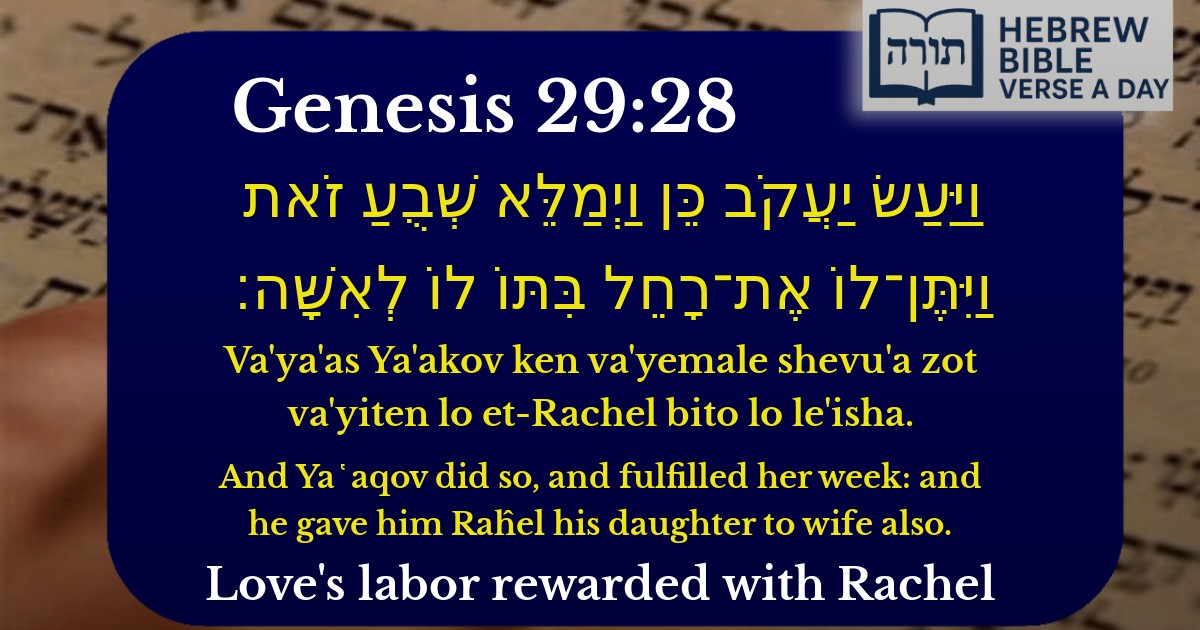Join Our Newsletter To Be Informed When New Videos Are Posted
Join the thousands of fellow Studends who rely on our videos to learn how to read the bible in Hebrew for free!
Hebrew Text
וַיַּעַשׂ יַעֲקֹב כֵּן וַיְמַלֵּא שְׁבֻעַ זֹאת וַיִּתֶּן־לוֹ אֶת־רָחֵל בִּתּוֹ לוֹ לְאִשָּׁה׃
English Translation
And Ya῾aqov did so, and fulfilled her week: and he gave him Raĥel his daughter to wife also.
Transliteration
Va'ya'as Ya'akov ken va'yemale shevu'a zot va'yiten lo et-Rachel bito lo le'isha.
Hebrew Leining Text
וַיַּ֤עַשׂ יַעֲקֹב֙ כֵּ֔ן וַיְמַלֵּ֖א שְׁבֻ֣עַ זֹ֑את וַיִּתֶּן־ל֛וֹ אֶת־רָחֵ֥ל בִּתּ֖וֹ ל֥וֹ לְאִשָּֽׁה׃
וַיַּ֤עַשׂ יַעֲקֹב֙ כֵּ֔ן וַיְמַלֵּ֖א שְׁבֻ֣עַ זֹ֑את וַיִּתֶּן־ל֛וֹ אֶת־רָחֵ֥ל בִּתּ֖וֹ ל֥וֹ לְאִשָּֽׁה׃
🎵 Listen to leining
Parasha Commentary
📚 Talmud Citations
This verse is quoted in the Talmud.
📖 Megillah 13b
The verse is referenced in the context of discussing the seven-year period Jacob worked for Rachel, illustrating the fulfillment of his commitment.
📖 Ketubot 57b
The verse is cited in a discussion about the laws of marriage and the fulfillment of contractual obligations, using Jacob's marriage to Rachel as an example.


Context of the Verse
The verse (Bereishit 29:28) describes Yaakov fulfilling his commitment to work an additional seven years for Lavan in order to marry Rachel after initially marrying Leah. This follows the earlier deception by Lavan, who gave Leah to Yaakov instead of Rachel, as originally agreed.
Rashi's Explanation
Rashi (Bereishit 29:27) explains that the phrase "וַיְמַלֵּא שְׁבֻעַ זֹאת" ("and fulfilled her week") refers to the seven days of the wedding feast for Leah. After completing this week, Yaakov was then permitted to marry Rachel, as it would be inappropriate to marry two sisters simultaneously without an intervening period (based on the principle of לא תעשינה אגודות אגודות—not forming competing factions within a household).
Talmudic and Halachic Insights
Midrashic Perspectives
The Midrash (Bereishit Rabbah 70:19) elaborates that Yaakov's willingness to work an additional seven years for Rachel demonstrated his deep love for her, as the years seemed to him like mere days due to his devotion (as referenced earlier in Bereishit 29:20).
Moral and Ethical Lessons